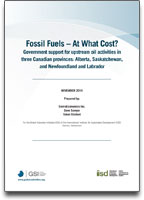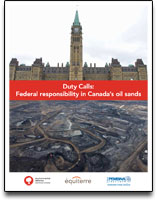
News |
- Reports Show Subsidies to Canadian Fossil Fuel Industry
- Manitoba East Side Heats Up
- Bio-Piracy Protocol Adopted
- Clinton Rebuked for Oil Sands Pipeline Comments
- New Building--Plumbing Codes for Manitoba
- Manitoba Launches Year-Round Commuter Challenge
- Canada Has Duty to Regulate Oil Sands
- Attempting New Biodiversity Pact
- Environment Proposal Filed for Beaconia Boat Project
- Oil Pipeline, Tankers Opposed
- Hydro Whistle Blower: Reports Made Public
- Retiring Reeves Ram Development Plan Through
| Reports Show Subsidies to Canadian Fossil Fuel Industry | 9 November 10 |
 Two recent reports outline the subsidies provided by Canada's federal and provincial governments towards fossil fuel production.
Two recent reports outline the subsidies provided by Canada's federal and provincial governments towards fossil fuel production.Fossil Fuels - At What Cost? released by International Institute for Sustainable Development (IISD) uses an internationally agreed definition of subsidy adopted by the World Trade Organization to determine that Canadian federal and provincial governments provided $2.84 billion to support oil production in 2008. The federal government's share of subsidies in 2008 was $1.38 billion. Alberta was estimated at $1.05 billion, Saskatchewan at $327 million. A total of 63 subsidy programs were identified, and the study forecasts a doubling of subsidy amounts by 2020 if government policies stay the same. Climate Action Network Canada released, Fuelling the Problem, November 4, 2010. The report describes problems with tax breaks for the fossil fuel industry, outlines global initiatives to eradicate fossil fuel subsidies, and urges the Canadian federal government to eliminate fossil fuel subsidies in the upcoming 2011 budget. "As the world moves towards a clean energy economy, ongoing tax breaks and subsidies to the fossil fuel sector are taking Canada in the wrong direction," declared Steven Guilbeault of Equiterre. "The reality is this government isn't fighting climate change, it is fuelling the problem and the 2011 budget is an opportunity to move the country in the right direction," added Graham Saul of Climate Action Network Canada. View November 2010 IISD report, Fossil Fuels - At What Cost? (PDF)View November 2, 2010 Winnipeg Free Press article View November 2, 2010 IISD press release View November 3, 2010 CTV News article View November 4, 2010 Climate Action Network press release View November 4, 2010 Climate Action Network report, Fueling the Problem (PDF) View November 4, 2010 National Post article View November 8, 2010 Rabble.ca article Source: IISD, CANet |
|
 Print version Print version |
Top |
| Manitoba East Side Heats Up | 8 November 10 |
 In 2009 an Act of the Legislature, "The East Side Traditional Lands Planning and Special Protected Areas Act." passed third reading after the former minister added the principles enshrined in the East Side Accord signed between the Manitoba government, and the First Nations. Only one of the First Nations speaking to the Legislative Committee supported the Act.
In 2009 an Act of the Legislature, "The East Side Traditional Lands Planning and Special Protected Areas Act." passed third reading after the former minister added the principles enshrined in the East Side Accord signed between the Manitoba government, and the First Nations. Only one of the First Nations speaking to the Legislative Committee supported the Act.In 2010 another Act of the Legislature "The Pimachiowin Aki World Heritage Fund Act" established the mechanism for a trust fund with The Winnipeg Foundation so donations will earn interest that communities within in the world heritage site could access for planning, monitoring, and other community projects. To date no funds have been made available, though the Manitoba government has pledged $10,000,000 in support. In late October 2010 the CEOs of Canada's national environmental organizations presented an award to the Manitoba government for promotion of the "World Heritage Site". The world heritage site lands remain unprotected from industrial development, except for the interim protected land designated in 1999. The Manitoba government continues to stress its support for the future world heritage site. On November 8, 2010 an advertising and fundraising campaign for the world heritage site was launched. Presumably paid for with public funds the campaign seeks to promote the future world heritage site, while raising funds to be placed in the trust with The Winnipeg Foundation. An upgraded Pimachiowin Aki World Heritage Site web site and a separate web site for the campaign were also launched. View October 25, 2010 Manitoba Government press releaseView October 25, 2010 Environmental Defense Canada release View October 27, 2010 Winnipeg Free Press article View November 8, 2010 Winnipeg Free Press article View Pimachiowin Aki web site View Pimachiowin Aki fund raising web site View The East Side Traditional Lands Planning and Special Protected Areas Act View The Pimachiowin Aki World Heritage Fund Act View Manitoba Wildlands World Heritage Site page View Manitoba Wildlands East Side planning page Source: Manitoba Government |
|
 Print version Print version |
Top |
| Bio-Piracy Protocol Adopted | 5 November 10 |
 The 10th International Conference of the Parties (COP) of the Convention on Biological Diversity (CBD) in Nagoya, Japan, October 18-29, 2010 adopted a new legally binding agreement to combat biopiracy with rules for sharing benefits from resources (The Nagoya Protocol on Access to Genetic Resources and the Fair and Equitable Sharing of Benefits Arising from Their Utilization).
The 10th International Conference of the Parties (COP) of the Convention on Biological Diversity (CBD) in Nagoya, Japan, October 18-29, 2010 adopted a new legally binding agreement to combat biopiracy with rules for sharing benefits from resources (The Nagoya Protocol on Access to Genetic Resources and the Fair and Equitable Sharing of Benefits Arising from Their Utilization).An agreement came at the last minute October 30 after Ryu Matsumoto, Japan's environment minister, intervened. China and India wanted to nationalize genetic resources within their boundaries. The European Union, Canada, Australia -- which have large pharmaceutical and cosmetic industries -- resisted attempts to include products like biochemicals from plants and other species in the Protocol. The Nagoya Protocol requires ratification by each of the 193 government signatories. Canada was criticized for seeking to exclude two provisions drafted for benefit of indigenous people: a reference to the United Nations Declaration of the Rights of Indigenous People (UNDRIP); and an affirmation that "...the rights indigenous and local communities have now or may have in the future," would not be diminished. This prompted Canada's National Chief Shawn Atleo to write Canadian Environment Minister, Jim Prentice a letter. "First Nations firmly support the inclusion of references to United Nations Declaration of the Rights of Indigenous People, as well as a non-derogation clause," wrote Chief Atleo. Ultimately both provisions survived, but the non-derogation clause was weakened. "The Protocol gets indigenous people to a place where we can talk directly to nation states about our existing rights regarding genetic resources and value of traditional knowledge in the use of those resources," said Preston Hardison, a treaty rights expert with the Tulalip Tribes in Washington State, USA. View October 17, 2010 Convention On Biological Diversity report (PDF)View October 21, 2010 Letter from Chief Atleo to Minister Prentice (PDF) View October 29, 2010 United Nations Nagoya Protocol On Access To Genetic Resources (DOC) View October 29, 2010 Environment Canada press release View October 31, 2010 International Press Service article View November 1, 2010 United Nations press conference Source: International Press Service, Convention on Biological Diversity |
|
 Print version Print version |
Top |
| Clinton Rebuked for Oil Sands Pipeline Comments | 3 November 10 |
 Eleven influential U.S. senators, led by Vermont Democratic Senator Patrick Leahy, sent a letter dated October 29, 2010 to U.S. Secretary of State Hillary Clinton rebuking her for stating support for a controversial pipeline before her own agency has completed a legally mandated environmental impact analysis. The letter criticizes remarks Secretary Clinton made October 15 at San Francisco's Commonwealth Club indicating that she is "inclined" to approve the controversial pipeline.
Eleven influential U.S. senators, led by Vermont Democratic Senator Patrick Leahy, sent a letter dated October 29, 2010 to U.S. Secretary of State Hillary Clinton rebuking her for stating support for a controversial pipeline before her own agency has completed a legally mandated environmental impact analysis. The letter criticizes remarks Secretary Clinton made October 15 at San Francisco's Commonwealth Club indicating that she is "inclined" to approve the controversial pipeline."As you recently stated, tar sands oil is 'dirty oil'. Approval of this pipeline will significantly increase our dependence on this oil for decades. We believe the Department of State (DOS) should not pre-judge the outcome of what should be a thorough, transparent analysis of the need for this oil and its impacts on our climate and clean energy goals," the Senators wrote. "We applaud Senator Leahy's leadership in championing clean energy over more dirty, dangerous oil," said Alex Moore, dirty fuels campaigner for Friends of the Earth. "This powerful letter is another example of how the largest oilsands customer, the United States, is carefully watching oilsands development in Canada. It is time the Alberta and federal governments strengthened and enforced laws and regulations to reduce water and greenhouse gas pollution, and damage to forests and wildlife from oilsands development," stated Danielle Droitsch, U.S. Policy Director for the Pembina Institute. The Keystone XL pipeline would be constructed by Canadian oil and gas giant TransCanada. If approved, the pipeline will move oil from Canada through the U.S. plains to Gulf Coast refineries near Houston at a rate of 900,000 barrels per day. The pipeline has been opposed by environmental, agricultural, and tribal organizations. More than 50 members of Congress have also voiced strong concerns, and more than 48,000 activists urged the Obama administration to reject the pipeline during the State Department's public comment period. View October 29, 2010 Senators' letter to Secretary of State Clinton (PDF)View October 29, 2010 Pembina Institute media release View October 29, 2010 Friends of the Earth media release View November 1, 2010 New York Times article View November 1, 2010 Mother Jones article View November 1, 2010 Reuters article Source: Pembina Institute, Friends of the Earth |
|
 Print version Print version |
Top |
| New Building--Plumbing Codes for Manitoba | 1 November 10 |
 Amendments to Manitoba building and plumbing codes take effect December 1, 2010. The changes are the result of Manitoba Fire Commissioner consultations with homebuilders, contractors and technical experts. The new codes will be applied to new construction and homes undergoing extensive renovations.
Amendments to Manitoba building and plumbing codes take effect December 1, 2010. The changes are the result of Manitoba Fire Commissioner consultations with homebuilders, contractors and technical experts. The new codes will be applied to new construction and homes undergoing extensive renovations."These changes are designed to further reduce our footprint on the environment and help Manitobans have a greener future," explained the Minister responsible for the changes Jennifer Howard, "for an average two-storey, gas-heated home, carbon-dioxide emissions will be reduced by more than half or about 1.25 tonnes per year." Building code changes include: specifying minimum energy-efficiency requirements for windows, eliminating the pilot light in gas fireplaces, increasing the required level of attic insulation to R50, requiring a minimum 94 per cent fuel-efficiency rating for furnaces, specifying a mid-efficient heat-recovery ventilator, and introducing energy-modelling software. Changes to the plumbing code allow for reduced maximum-flow rates in residential water devices such as toilets and shower heads. In addition, they will allow the reuse of non-potable (grey) water for other applications around the home if it meets the Canadian Standards Association grey water standard expected to be released in December 2010. View October 15, 2010 Government of Manitoba news releaseView October 15, 2010 Winnipeg Sun article View October 15, 2010 Winnipeg Free Press article View Manitoba's new Building and Plumbing Code Amendments on Energy and Water Efficiency (PDF) View Manitoba Regulation 142/2010, Manitoba Building Code, amendment (PDF) View Manitoba Regulation 143/2010, Manitoba Building Code, amendment (PDF) Source: Manitoba Government |
|
 Print version Print version |
Top |
| Manitoba Launches Year-Round Commuter Challenge | 29 October 10 |
 Manitobans demonstrated an outstanding commitment to environmentally friendly transportation, finishing at the top of the 2010 national Commuter Challenge. Manitoba's program is being expanded to operate year-round in the province.
Manitobans demonstrated an outstanding commitment to environmentally friendly transportation, finishing at the top of the 2010 national Commuter Challenge. Manitoba's program is being expanded to operate year-round in the province.Manitobans logged more than 700,000 green kilometres during the 2010 national Commuter Challenge. This reduced greenhouse-gas emissions by about 200 tonnes, the equivalent of burning more than 60,000 litres of motor vehicle fuel. To encourage Manitobans to continue choosing active and climate-friendly transportation, the Green Action Centre will operate the Commuter Challenge year-round. "We invite all Manitobans to take part in the new Manitoba Year-round Commuter Challenge," said Randall McQuaker. "We are pleased to partner with the province to expand the week-long national challenge to a year-round initiative here at home, a first in Canada." The year-round commuter challenge will encourage Manitobans to leave their vehicles at home and walk, cycle, take public transit, carpool or share rides instead of driving to work alone. View October 15, 2010 Manitoba Government news releaseView Green Action Centre, Year-Round Commuter Challenge website Source: Manitoba Government |
|
 Print version Print version |
Top |
| Canada Has Duty to Regulate Oil Sands | 29 October 10 |
 The Canadian federal government has a constitutional responsibility to not only protect Canada's water, but to protect wildlife, meet its climate commitments and ensure appropriate consultation with aboriginal groups. A new report Duty Calls released October 20, 2010 by three of Canada's leading environmental organizations — the Pembina Institute, Environmental Defence and Équiterre states the duties.
The Canadian federal government has a constitutional responsibility to not only protect Canada's water, but to protect wildlife, meet its climate commitments and ensure appropriate consultation with aboriginal groups. A new report Duty Calls released October 20, 2010 by three of Canada's leading environmental organizations — the Pembina Institute, Environmental Defence and Équiterre states the duties.The report urges use of regulations already in place in the Fisheries Act, the Species At Risk Act and the Canadian Environmental Protection Act to ensure sustainable development of the oil sands. The report was written due to a lack of recognition that Canada's federal government has a responsibility to protect the environment in areas of oil sands development, said Simon Dyer, oil sands director at the Pembina Institute. "The recent science panel appointment on water pollution was a good first step, but now we need action to enforce the full range of federal laws in the oil sands," Dyer added. "We keep hearing that the tar sands are the economic engine of Canada, but what type of engine drives some of its passengers over a cliff?" indicated Deputy Director of Équiterre Steven Guilbeault. "We seem to be stuck in neutral as a country on this [oil sands] issue," Environmental Defence executive director Rick Smith said, adding, "Energy industries like to paint environmentalists as out to shut down oil production completely. That's not the case oil is going to be a transitional fuel, but we've got to talk about how to get there." View October 20, 2010 Pembina Institute reportView October 20, 2010 Pembina Institute article View October 20, 2010 CBC News article View October 21, 2010 Edmonton Journal article View October 21, 2010 Reuters article View October 28, 2010 Toronto Star article Source: Pembina Institute, Équiterre |
|
 Print version Print version |
Top |
| Attempting New Biodiversity Pact | 29 October 10 |
 The fate of the UN Convention on Biological Diversity is being decided by 193 national delegations at the 10th International Conference of the Parties of the Convention on Biological Diversity in Nagoya, Japan, October 18-29, 2010.
The fate of the UN Convention on Biological Diversity is being decided by 193 national delegations at the 10th International Conference of the Parties of the Convention on Biological Diversity in Nagoya, Japan, October 18-29, 2010.The two-week conference aims to set targets for 2020 to slow or stop the alarming rate of extinction of plants, animals, and damage to ecosystems. Brian Mulroney, past Prime Minister of Canada, signed the convention on behalf of Canada in 1992. At that time countries agreed to cut species loss "significantly" and preserve 10 per cent of the world's ecological regions by 2010. All countries, including Canada, have failed to meet obligations under the Treaty. Mass extinction continues apace at between 1,500 and 15,000 species a year. "Missing the 2010 targets should inspire us all to do better. I do hope we will successfully negotiate a new protocol," said Canadian Minister of Environment Jim Prentice. However, scientists and aboriginal groups have decryed Canada's negotiating tactics. "Canada is playing a particularly obstructive role in those negotiations which could be disastrous for biodiversity globally," said British biologist Stuart Butchart, of Birdlife International. "The Canadian government has been undermining the human rights of the world's indigenous peoples," said Paul Joffe representing the Grand Council of the Crees, a large indigenous nation in central Canada. Japan meanwhile pledged $2 billion dollars in an attempt to spur the stalled negotiations. "We must stop this great extinction in our lifetime," said Japanese Prime Minister Naoto Kan. View October 17, 2010 Globe and Mail articleView October 21, 2010 IPS News article View October 27, 2010 Vancouver Sun article View October 27, 2010 CBC News article View October 27, 2010 CBC News article View October 27, 2010 Asia-Pacific News article View October 29, 2010 Guardian article Sources: The Globe and Mail, IPS News, Vancouver Sun |
|
 Print version Print version |
Top |
| Environment Proposal Filed for Beaconia Boat Project | 27 October 10 |
 An Environment Act Proposal has been filed by Robert and Margaret Rettie for the Rettie Boat Access project near Beaconia, Manitoba. The proposal indicates the canal is approximately 500 metres long, 8 metres wide and 2 metres deep. It provides private boat access from the Beaconia Marsh to the Southwest corner of Lake Winnipeg for the Retties.
An Environment Act Proposal has been filed by Robert and Margaret Rettie for the Rettie Boat Access project near Beaconia, Manitoba. The proposal indicates the canal is approximately 500 metres long, 8 metres wide and 2 metres deep. It provides private boat access from the Beaconia Marsh to the Southwest corner of Lake Winnipeg for the Retties.The canal was constructed during the winter of 2009/2010 without the proper license under Manitoba's Environment Act. The province issued a stop-work order on the project after residents complained. The boat launch and docking facilities as well as the stabilization of disturbed soil remain to be completed. The project is now subject to a provincial environmental review. Residents fear damage to the marsh has already been done, and will continue. Public lands and waters have been effected. "What's the effect on drainage? What's the effect on wildlife? What's the effect on the lake? What about public access? We don't know any of those answers," said Eastern Beaches Conservation Coalition spokesman David Crabb. Anyone likely to be affected by the above operation and who wishes to make a representation either for or against the proposal should contact the Department, in writing or by e-mail (bruce.webb@gov.mb.ca), not later than November 22, 2010. View Public Registry - Robert and Margaret Rettie - Rettie Boat Access (Public Registry file #5486)View Eastern Beaches Conservation Coalition website View August 20, 2010 Winnipeg Free Press article View September 8, 2010 Selkirk Journal article Source: Environmental Assessment and Licensing Branch |
|
 Print version Print version |
Top |
| Oil Pipeline, Tankers Opposed | 27 October 10 |
 During October, 2010 The Union of British Columbia Municipalities (UBCM) voted to oppose a controversial pipeline proposal and the presence of oil tankers on the province's North Coast.
During October, 2010 The Union of British Columbia Municipalities (UBCM) voted to oppose a controversial pipeline proposal and the presence of oil tankers on the province's North Coast.Delegates at the annual UBCM conference overwhelmingly passed two motions: The first urged Ottawa to legislate a ban on bulk crude oil tanker traffic through Queen Charlotte Sound, Dixon Entrance and Hecate Strait. The second motion opposes the Northern Gateway pipeline between Alberta's oilsands and the B.C. coast, proposed by Enbridge Inc. "Opposition in the province appears to be growing as more people learn about issues such as tanker traffic in coastal waters", said Leslie Johnson, a councillor with the Village of Queen Charlotte. Chief Larry Nooski of the Nadleh Whut'en First Nation said the pipeline project is not worth the risk. "The pipelines and tankers, if they are approved, would have major environmental, social, cultural, legal and economic impacts for First Nations all along the route, on the coast, and upstream and downstream of the pipeline," he said in a written statement. "If this project is approved, it would risk an oil spill that would destroy our food supply, our livelihoods and our cultures." Calgary-based Enbridge Inc. wants to build two parallel pipelines stretching 1,170 kilometres from the Alberta oilsands to the West Coast. The National Energy Board is preparing to hold public hearings on the proposed project. View October 1, 2010 CBC News articleView October 1, 2010 Burnaby News article View October 1, 2010 CTV News article View October 2, 2010 Calgary Herald article Source: CBC News, CTV News |
|
 Print version Print version |
Top |
| Hydro Whistle Blower: Reports Made Public | 22 October 10 |
 On September 27, 2010, following Manitoba Public Utility Board (PUB) Order 95/10 numerous reports with PUB approved redactions were released as part of the PUB's 2010-11 and 2011-12 General Rate Application (GRA) hearings. Censored versions of the reports were first placed on the PUB website in July of 2010.
On September 27, 2010, following Manitoba Public Utility Board (PUB) Order 95/10 numerous reports with PUB approved redactions were released as part of the PUB's 2010-11 and 2011-12 General Rate Application (GRA) hearings. Censored versions of the reports were first placed on the PUB website in July of 2010.Included in the released reports was KPMG's report "Manitoba Hydro - External Quality Review". Manitoba Hydro dropped a court application to make public KPMG 's review of allegations of financial mismanagement and poor planning made by a New York City consultant. The Consultant, who cannot be named for legal reasons, claims to have found Manitoba Hydro lost more than $1 billion over the last five years and could even face bankruptcy and blackouts due to bad drought planning and export pricing. On December 8, 2008 the New York based consultant made a Public Interest Disclosure (Whistleblower Protection) Act Complaint to the Manitoba Ombudsman. Manitoba Hydro hired KPMG in 2009 to double-check the consultant's findings. The consultant sent a letter December 8, 2009 to KPMG to cease and desist using materials that were contractually protected by confidentiality agreements between the consulting firm and Manitoba Hydro. The PUB is a government body that regulates the rates Hydro can charge its customers. The PUB GRA hearings are scheduled to start January 2011. "MH (Manitoba Hydro) and the GRA Interveners will now have access to public record versions of the KPMG report and appendices, MH risk reports, and the NYC 'public document' which identifies risk issues. The independent experts' report will supplement the current set of risk reports available, as will any risk reports filed by the Interveners," explained the PUB. View September 21, 2010 Winnipeg Free press articleView October 5, 2010 Winnipeg Sun article View Manitoba Hydro Press Release: KPMG External Quality Review Report Released View PUB Manitoba Hydro 2010-11 Filings View "Risk Allegations Response" a message from Bob Brennan, President & CEO, Manitoba Hydro View April 2010 KPMG report (PDF) View September 20, 2010 PUB Order 95/10 (PDF) View Public Interest Disclosure (Whistleblower Protection) Act Source: Winnipeg Sun |
|
 Print version Print version |
Top |
| Retiring Reeves Ram Development Plan Through | 22 October 10 |
 In the midst of province wide municipal elections campaign the Whitemouth-Reynolds Planning District (WRPD), which is comprised of the Rural Municipalities (R.M.) of Whitemouth and Reynolds, moved forward with second reading of by-law 27/10, the Whitemouth Reynolds District Development Plan (Whitemouth Plan).
In the midst of province wide municipal elections campaign the Whitemouth-Reynolds Planning District (WRPD), which is comprised of the Rural Municipalities (R.M.) of Whitemouth and Reynolds, moved forward with second reading of by-law 27/10, the Whitemouth Reynolds District Development Plan (Whitemouth Plan).Manitoba municipalities are required to have a development plan consistent with the Public Land Use Policies regulation under the Planning Act. Following the Whitemouth Plan's first reading June 14, 2010, it was forwarded to the Technical Review Committee (TRC) and a public hearing was held August 16, 2010. Manitoba government departments and public presenters raised numerous concerns and recommended against second reading. Despite these concerns, the WRPD moved second reading at a Special Meeting held September 24th, 2010. It will now be up to Manitoba Minister of Local Government Ron Lemieux to determine if the Whitemouth Plan will move to third reading and become law. Andy Pelletier, Councilor for Reynolds, is the only one of four elected officials on the WRPD seeking re-election October 27th. Whitemouth Reeve Glenn Malkoske, Whitemouth Councilor Bill Boonstra, and Reynolds Reeve Donna Shandroski, who all voted in favour of the Whitemouth Plan, are not seeking re-election beyond 2010. Residents of Seven Sisters, a community located inside Whitemouth RM, formed the Seven Sisters Community Association (SSCA) September 2009 to address issues with the R.M. and Manitoba Hydro. The organization now has 170 members, and is still growing. SSCA Spokesperson/Secretary Allison Mantrone-Cardinal reported that the SSCA is concerned that the outgoing Reeves and Councilmember, in their haste to get the plan approved, have ignored legitimate issues brought forth by the government and the public — issues that must be addressed before any plan becomes law. View Manitoba Wildlands detailed coverageView Whitemouth Plan after second reading View October 18, 2010 objection letter of Allison Mantrone-Cardinal Source: RM of Whitemouth |
|
 Print version Print version |
Top |


 RSS Feeds:
RSS Feeds: